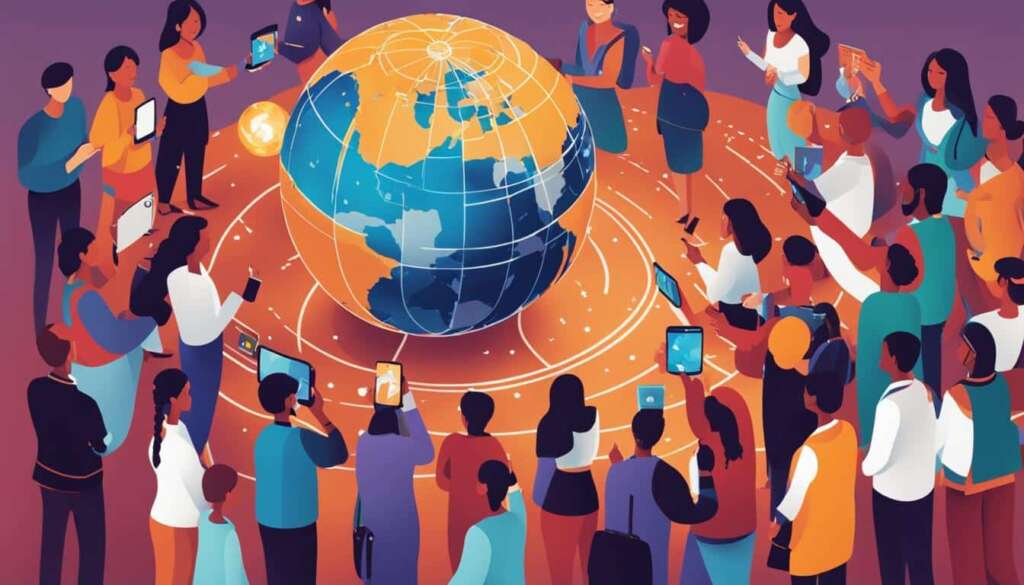Table of Contents
The adoption of artificial intelligence, particularly machine learning, is on the rise. OpenAI’s ChatGPT, a conversational AI chatbot powered by GPT-3.5, has gained attention for its ability to simulate human-like conversations and generate original text. ChatGPT was released to the public in November 2022 and has since gained over 100 million monthly active users. While it has impressive generative capabilities, it’s important to consider the potential risks and benefits of integrating this technology into democratic decision-making processes.
ChatGPT has the potential to reshape the landscape of AI democracy by revolutionizing the way citizens engage with political systems. The use of AI in democratic processes has the power to democratize AI technology and make it accessible to a wider audience. This advancement enables more people to actively participate in decision-making and have their voices heard.
The Security Issues Surrounding ChatGPT
ChatGPT, with its AI-powered capabilities, presents a number of security concerns when integrated into democratic systems. The centralized access it provides to information can be exploited by malicious actors, posing risks to the security of data and systems. For instance, there have been reports of individuals using ChatGPT to inquire about illegal activities such as bank robbery, explosives manufacturing, and cyberattacks on computer systems. Additionally, it can be leveraged to generate convincing phishing messages and develop malware, further exacerbating security risks in the digital landscape.
These security issues emphasize the importance of thorough scrutiny and regulation to ensure the safe and responsible use of AI-powered technologies, like ChatGPT, in democratic systems. Striking a balance between leveraging the benefits of AI and mitigating potential risks is crucial for maintaining a secure and trustworthy AI-powered democracy.
“Given its powerful capabilities, it is imperative that we address the security vulnerabilities associated with ChatGPT. The responsible use of AI in democratic systems requires robust measures to protect against data breaches, cyber threats, and potential misuse of the technology.”
The Need for Scrutiny and Regulation
To safeguard AI-powered democracy, it is essential to establish comprehensive frameworks encompassing security protocols, ethical guidelines, and accountability measures. A holistic approach to AI governance should address the following key areas:
- Ensuring data privacy and protection
- Implementing secure communication channels for ChatGPT
- Verifying the identity and intentions of users
- Monitoring and detecting malicious activities
- Establishing clear guidelines for the responsible use of AI in democratic processes
By proactively addressing these security challenges and implementing effective regulations, we can foster an AI-powered democracy that is protected against potential threats and conducive to fair and transparent decision-making.
| Security Issues with ChatGPT | Potential Impact |
|---|---|
| Centralized access to sensitive information | Risk of data breaches and unauthorized access |
| Exploitation for illegal activities | Potential for criminal actions, such as bank robberies and cyberattacks |
| Generation of believable phishing messages | Increase in successful phishing attacks and compromised data |
| Development of malware | Elevated risk of cyber threats and compromised systems |
The Political Implications of ChatGPT
ChatGPT’s ability to generate coherent and persuasive texts raises concerns about political manipulation and the spread of propaganda. Its effectiveness in imitating different writing styles can lead to the dissemination of misleading information and the amplification of certain political views on social media. The lack of a reliable mechanism to verify the truth of ChatGPT’s responses further exacerbates the issue. Ensuring the integrity of public opinion and countering disinformation require robust countermeasures and responsible use of AI technologies.
| Political Implications of ChatGPT | Solutions |
|---|---|
| 1. Political Manipulation | Implement strict regulations and guidelines for the use of ChatGPT in political campaigns and public discourse. |
| 2. Propaganda Spread | Develop AI algorithms to detect and flag potential propaganda generated by ChatGPT. |
| 3. Misleading Information | Create fact-checking mechanisms to verify the accuracy of ChatGPT’s responses. |
| 4. Amplification of Political Views | Promote diverse perspectives and ensure balanced representation on social media platforms. |
“The potential political implications of ChatGPT’s generative abilities cannot be understated. As AI becomes more influential in democratic systems, it is crucial to address the risks associated with political manipulation and the spread of propaganda. Only through responsible use and effective countermeasures can we safeguard the integrity of public opinion.”
Enhancing Customer Service in the Public Sector with ChatGPT
ChatGPT, with its advanced natural language processing capabilities, has the potential to transform customer service in the public sector. By leveraging AI technology, public sector organizations can provide personalized assistance and accurate information to the public, ensuring a seamless and efficient customer experience.
One of the key advantages of ChatGPT is its ability to access internal databases and knowledge repositories. This enables it to retrieve organization-specific information and provide contextually relevant responses to user queries. Whether citizens require information about government programs, services, or policies, ChatGPT can deliver accurate and up-to-date information, enhancing the overall customer experience.
Furthermore, ChatGPT’s availability round-the-clock allows public sector organizations to offer consistent and prompt customer support. Citizens can receive assistance and resolve their queries at any time, reducing the wait time and improving satisfaction levels. This accessibility ensures that citizens can access the information they need, whenever they need it, leading to greater transparency and trust in public sector services.
Case Study: Improved Efficiency and Reduced Workload
“Implementing ChatGPT in our government department has been a game-changer. The chatbot has not only improved the quality of customer service but also significantly reduced the workload on our staff. Citizens can now get immediate answers to their questions, allowing our employees to focus on more complex tasks and strategic initiatives. It has been a win-win for both citizens and our organization.”
– Jane Smith, Public Service Manager
Several successful implementations of chatbots in government agencies have already demonstrated the potential for improved efficiency and reduced staff workloads. With ChatGPT handling routine customer inquiries, government employees can allocate their time and resources to more critical tasks, such as policy-making and strategic planning. This not only enhances productivity but also allows public sector organizations to better utilize their workforce and deliver greater value to citizens.
With ChatGPT’s advanced AI capabilities, public sector organizations can transform their customer service operations, providing personalized assistance, improving efficiency, and reducing staff workload. The integration of AI technology in the public sector is paving the way for a more citizen-centric approach, leveraging the power of AI to enhance service delivery.
| Benefits of ChatGPT in Customer Service: |
|---|
| 1. Personalized assistance for citizens |
| 2. Access to internal databases and knowledge repositories |
| 3. Contextually relevant responses to user queries |
| 4. Round-the-clock availability for consistent and prompt customer support |
| 5. Improved efficiency and reduced workload for government employees |

Language Inclusivity and Communication Optimization with ChatGPT in the Public Sector
ChatGPT’s multilingual capabilities and training across diverse languages can foster language inclusivity in government communications. Conventional translation technologies often struggle with capturing contextual nuances, but ChatGPT’s training enables it to communicate more effectively across language barriers.
Integrating ChatGPT with communication platforms like Microsoft Word or Outlook can streamline information dissemination and collaboration in the public sector. It can extract key insights from messages and emails, enabling employees to focus on value-generating tasks and advancing their organizations’ missions.
With natural language processing at its core, ChatGPT can facilitate seamless interactions between citizens and government agencies. Whether it’s answering queries, providing information, or assisting with form submissions, ChatGPT offers a user-friendly experience that encourages public engagement.
ChatGPT’s language inclusivity and communication optimization capabilities empower diverse populations and bridge the gap between different linguistic communities. By breaking down language barriers, public sector organizations can foster a more inclusive and accessible environment, ensuring that all citizens can fully participate and benefit from government services.
In addition to its multilingual support, ChatGPT’s potential for communication optimization has significant implications in the public sector. By automatically processing and categorizing incoming messages, ChatGPT relieves employees of mundane tasks and allows them to focus on high-value work. Through its ability to extract key insights and generate relevant responses, ChatGPT enhances efficiency, saves time, and improves the overall citizen experience.
Conclusion
As ChatGPT continues to evolve, its impact on democracy cannot be ignored. While this AI technology has the potential to enhance democratic engagement and decision-making processes, it is essential that we address the security and political issues that arise with its use. By leveraging ChatGPT’s capabilities in customer service, language inclusivity, and communication optimization, public sector organizations can streamline operations and improve the citizen experience. This responsible integration of AI technologies like ChatGPT is a crucial step towards democratizing AI and shaping the future of democracy.
While ChatGPT presents exciting opportunities, it also raises concerns about security and ethics. The potential for malicious actors to exploit its capabilities highlights the need for thorough scrutiny and regulation. Additionally, the ability of ChatGPT to generate persuasive texts poses risks in terms of political manipulation and the spread of misinformation. To ensure the integrity of public opinion and counteract disinformation, robust countermeasures must be implemented.
However, the positive impact of ChatGPT should not be overlooked. In the public sector, this AI technology can revolutionize customer service by providing personalized assistance and accurate information to citizens. Its multilingual capabilities also foster language inclusivity, enabling effective communication across language barriers. By optimizing communication and streamlining operations, ChatGPT can significantly improve the efficiency and effectiveness of public sector organizations.
Looking ahead, the responsible integration of AI technologies like ChatGPT has the potential to democratize AI itself, making it more accessible and inclusive. It is crucial that we address the challenges and risks associated with its use to ensure that the future of democracy with AI remains ethical, secure, and beneficial for all.
FAQ
What is ChatGPT?
ChatGPT is a conversational AI chatbot powered by GPT-3.5, a powerful machine learning model developed by OpenAI. It can simulate human-like conversations and generate original text.
How can ChatGPT enhance democracy?
ChatGPT has the potential to enhance democracy by revolutionizing customer service in the public sector, fostering language inclusivity, and optimizing communication in government organizations.
What are the security issues surrounding ChatGPT?
ChatGPT poses security risks as it can provide centralized access to information that could be exploited by malicious actors. Measures need to be taken to ensure responsible and safe use of AI-powered technologies in democratic systems.
What are the political implications of ChatGPT?
ChatGPT’s ability to generate coherent and persuasive texts raises concerns about political manipulation and the spread of propaganda. Regulations and countermeasures are required to ensure the integrity of public opinion and counter disinformation.
How can ChatGPT enhance customer service in the public sector?
ChatGPT can provide personalized assistance, accurate information, and round-the-clock availability, enhancing the customer experience and improving efficiency in the public sector.
How does ChatGPT foster language inclusivity and communication optimization in the public sector?
ChatGPT’s multilingual capabilities enable effective communication across language barriers, and integrating it with communication platforms can streamline information dissemination and collaboration in government organizations.
What is the future of democracy with AI and ChatGPT?
The responsible integration of AI technologies like ChatGPT has the power to democratize AI and shape the future of democracy, but it requires addressing security, political, and ethical challenges.













